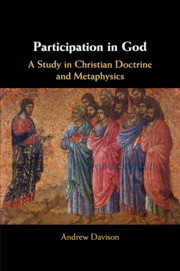Book contents
- Participation in God
- Participation in God
- Copyright page
- Dedication
- Epigraph
- Contents
- Acknowledgements
- Works of Thomas Aquinas: Texts, Translations, and Abbreviations
- Introduction
- I Participation and Causation
- 1 By and from God
- 2 ‘From Him and through Him and to Him Are All Things’
- 3 Not out of God
- 4 After God’s Likeness
- 5 To and for God
- II The Language of Participation and Language as Participation
- III Participation and the Theological Story
- IV Participation and the Shape of Human Life
- Conclusion
- Bibliography
- Index of Names
- Subject Index
- Index of Biblical References
- Index of Works of Aquinas
1 - By and from God
Efficient Causation and God as the Origin and Agent of Creation
from I - Participation and Causation
Published online by Cambridge University Press: 15 August 2019
- Participation in God
- Participation in God
- Copyright page
- Dedication
- Epigraph
- Contents
- Acknowledgements
- Works of Thomas Aquinas: Texts, Translations, and Abbreviations
- Introduction
- I Participation and Causation
- 1 By and from God
- 2 ‘From Him and through Him and to Him Are All Things’
- 3 Not out of God
- 4 After God’s Likeness
- 5 To and for God
- II The Language of Participation and Language as Participation
- III Participation and the Theological Story
- IV Participation and the Shape of Human Life
- Conclusion
- Bibliography
- Index of Names
- Subject Index
- Index of Biblical References
- Index of Works of Aquinas
Summary
In the first of five opening chapters on participation and divine causation, we look at 'efficient' or 'agent' causation: what it means, from a participatory perspective, for God to be the cause and agent of creation. The chapter situates the idea of participation within the foundational doctrine, common to the Abrahamic faiths, of creation as being ex nihilo. Nothing is coaeval with God; nor did God rely upon anything else for creation: on eternally existent matter, for instance. Creation is not some past event, now over, but should rather be seen as a relation of dependence upon the creator. This is explored in terms of gift and of the relation of the doctrine of creation to the doctrine of God. This leads on to a discussion of theological apologetics.
Keywords
- Type
- Chapter
- Information
- Participation in GodA Study in Christian Doctrine and Metaphysics, pp. 13 - 41Publisher: Cambridge University PressPrint publication year: 2019
- 1
- Cited by

